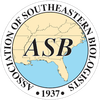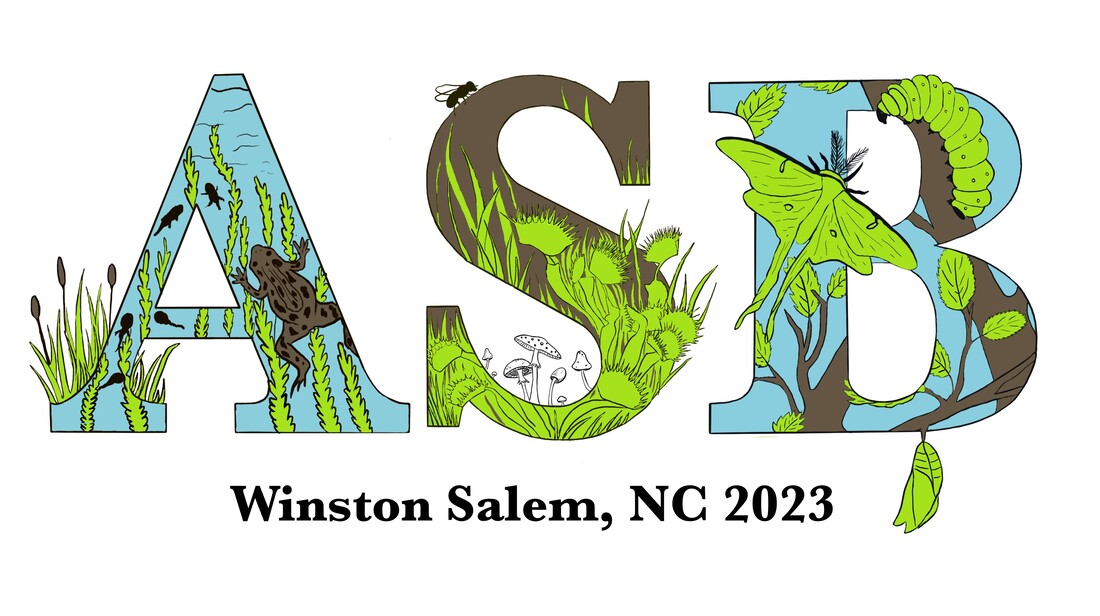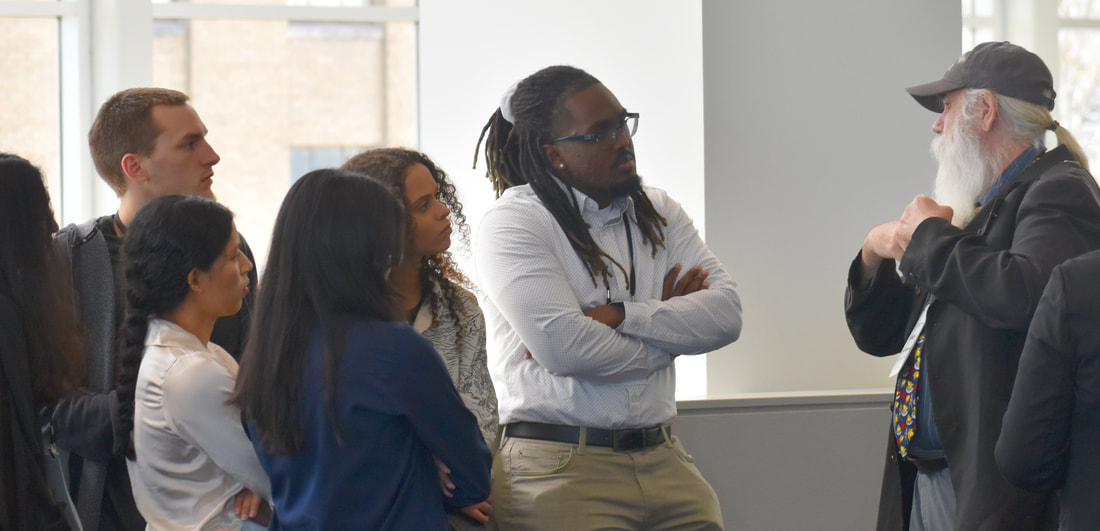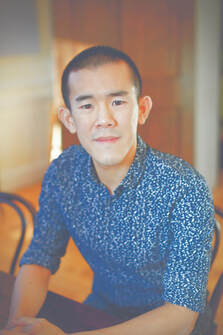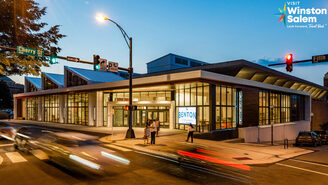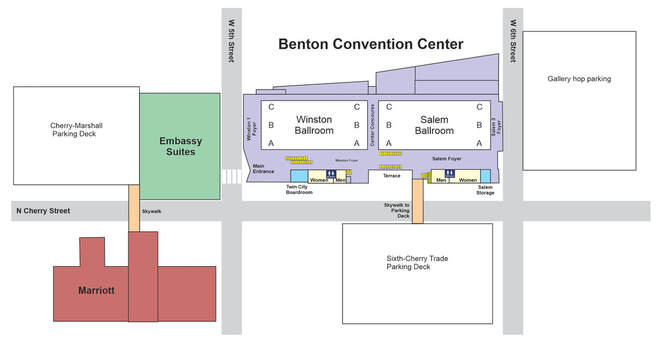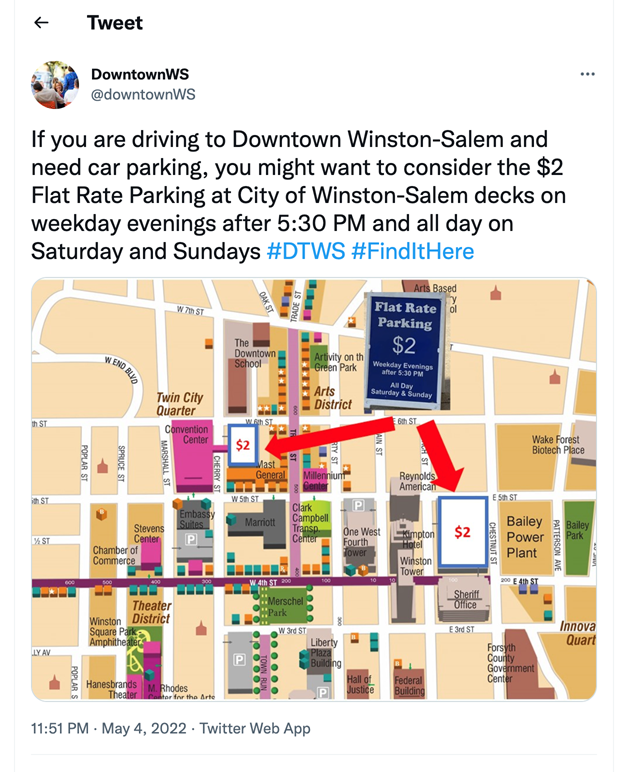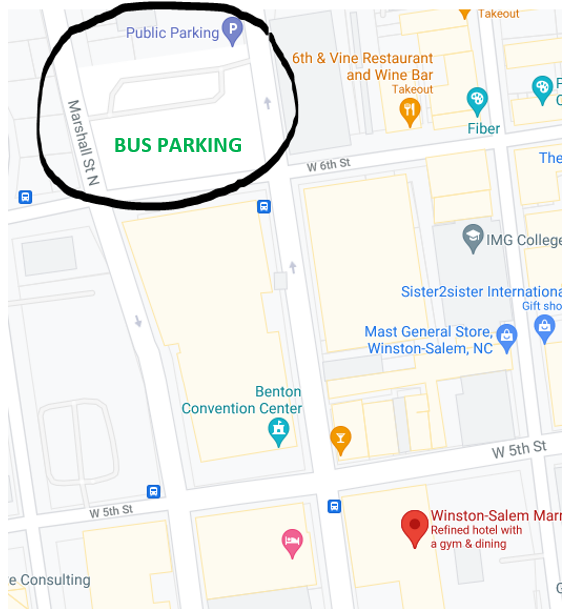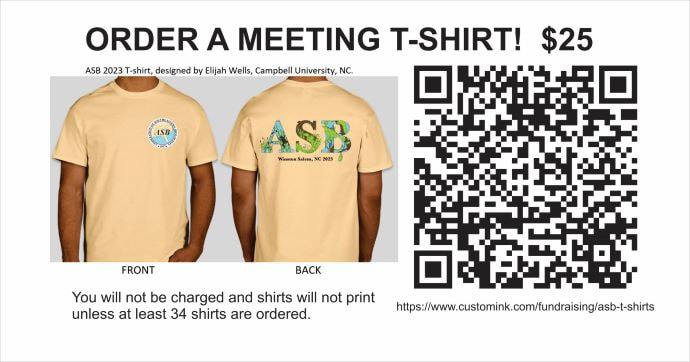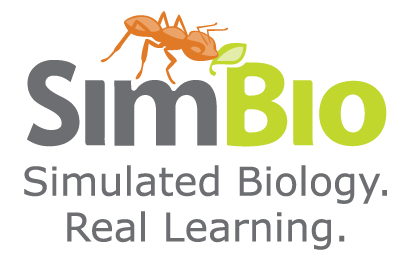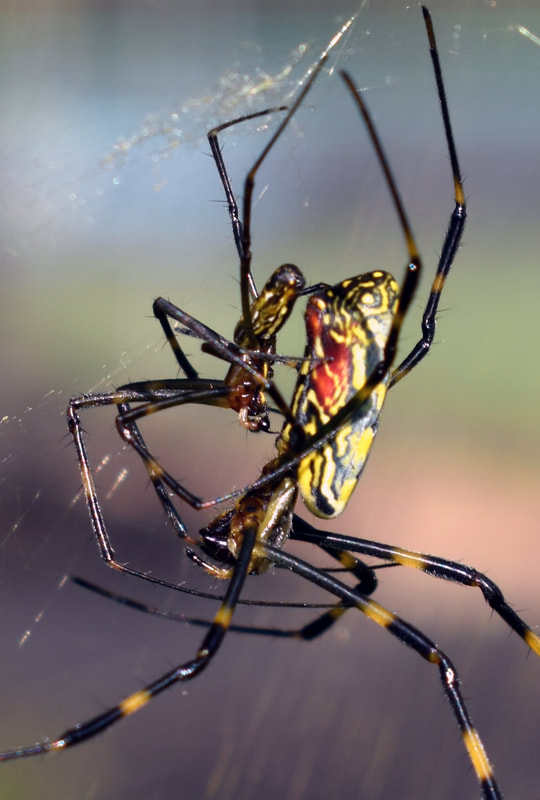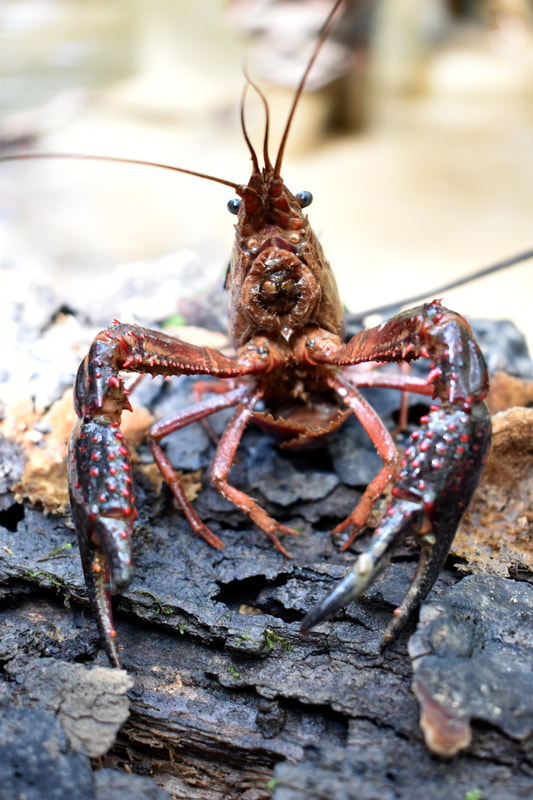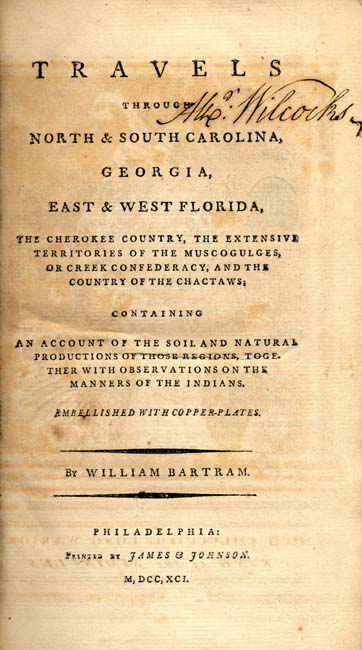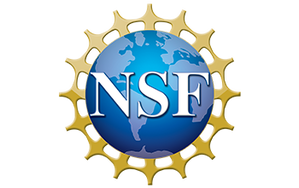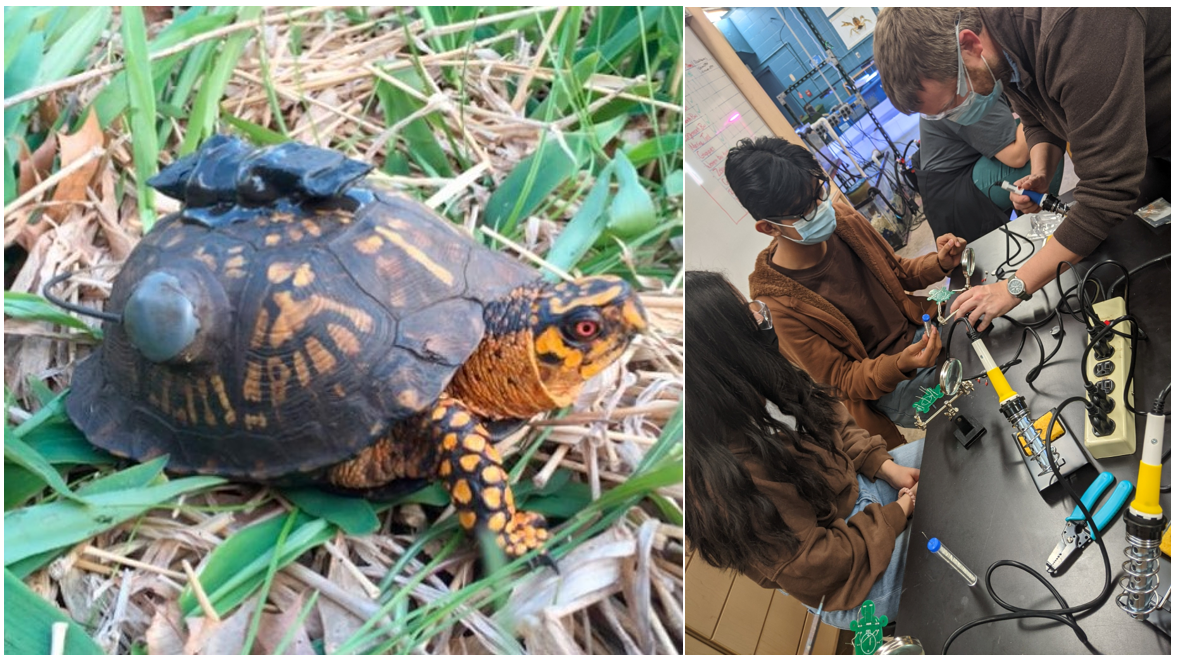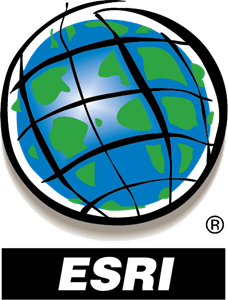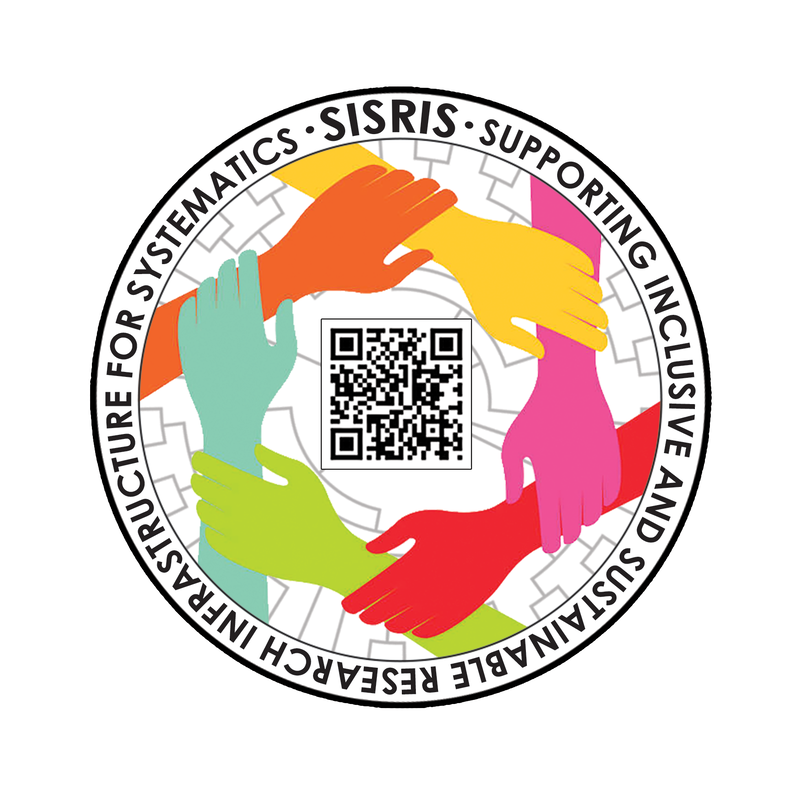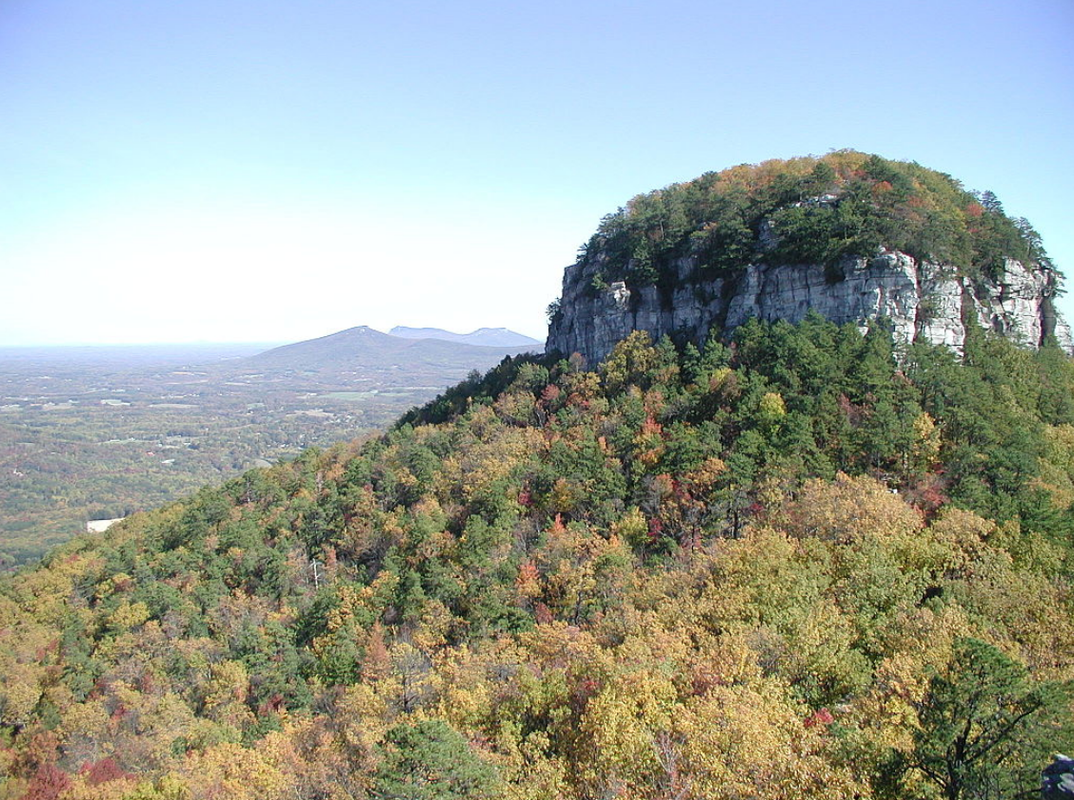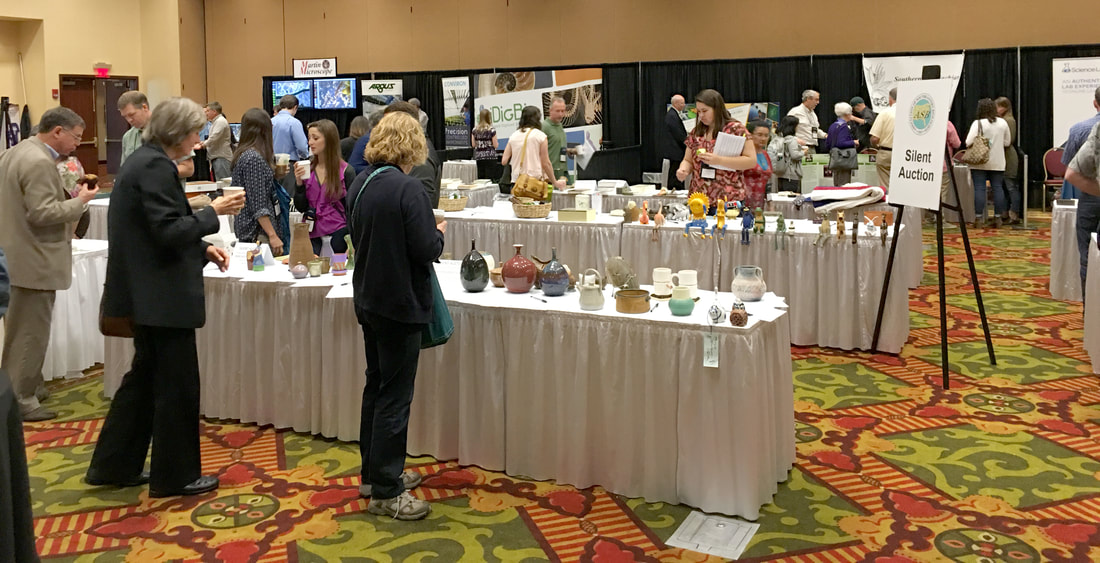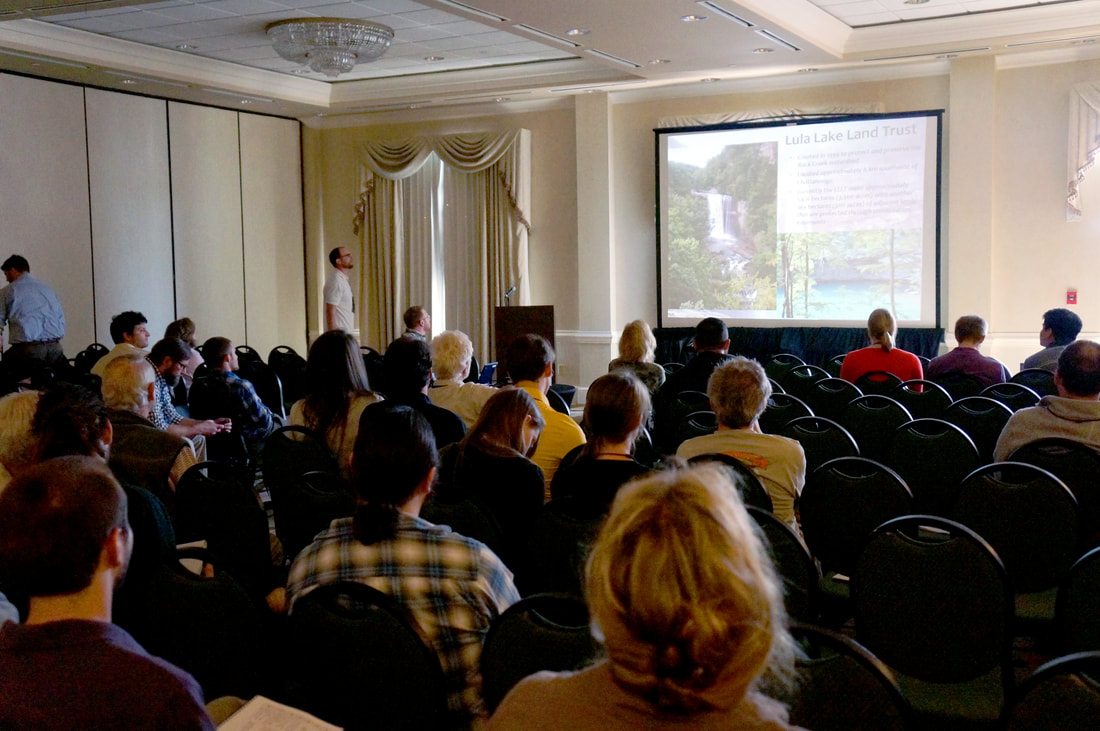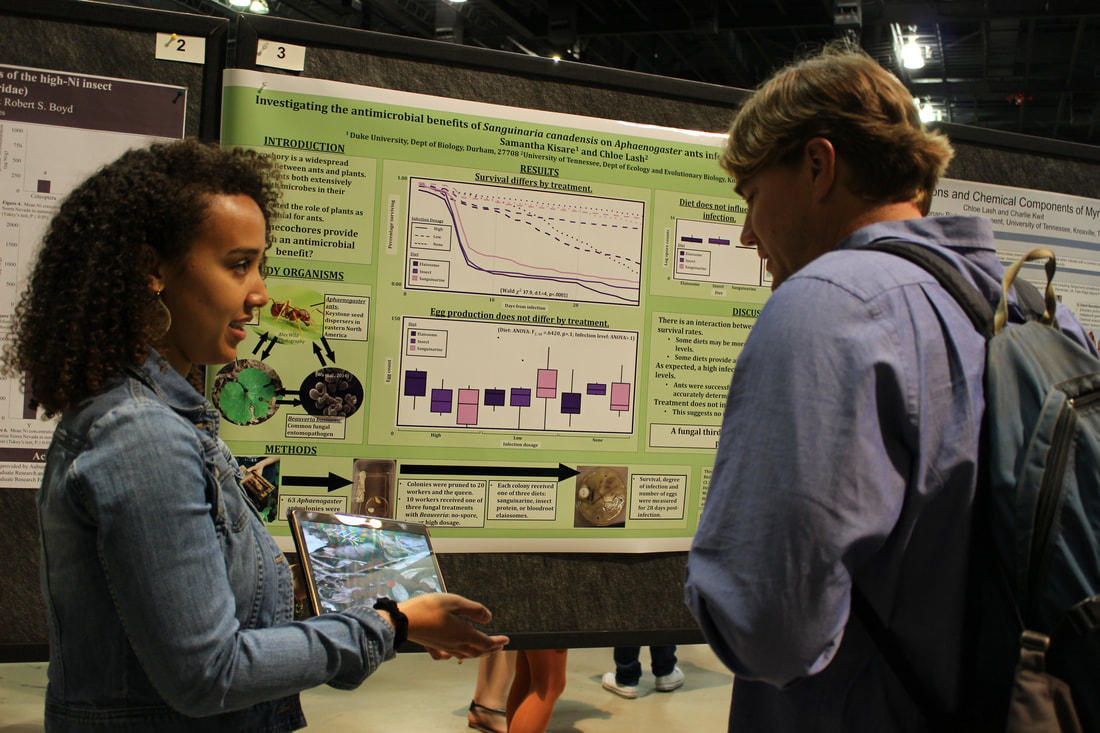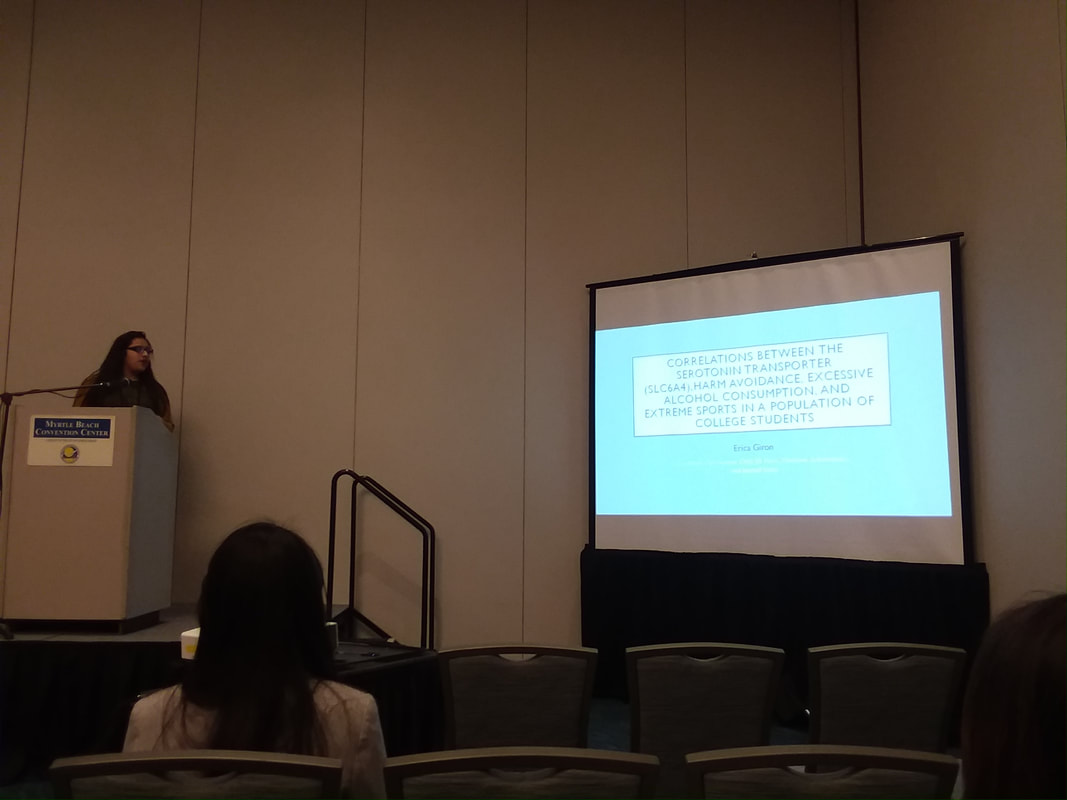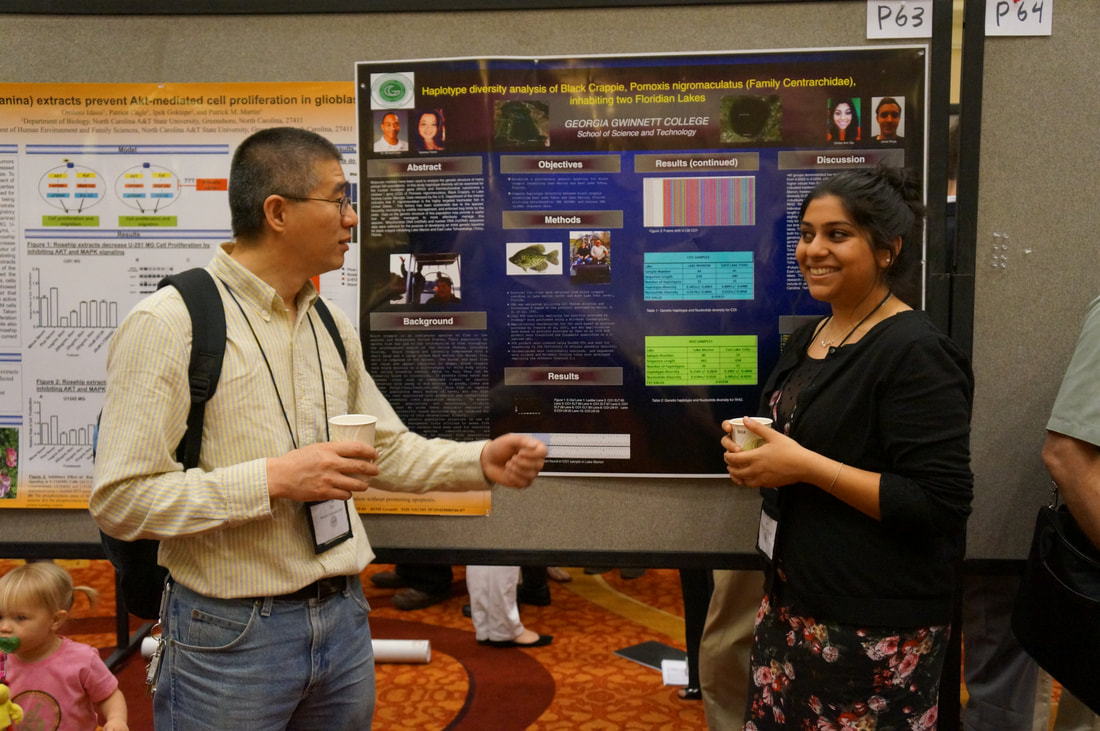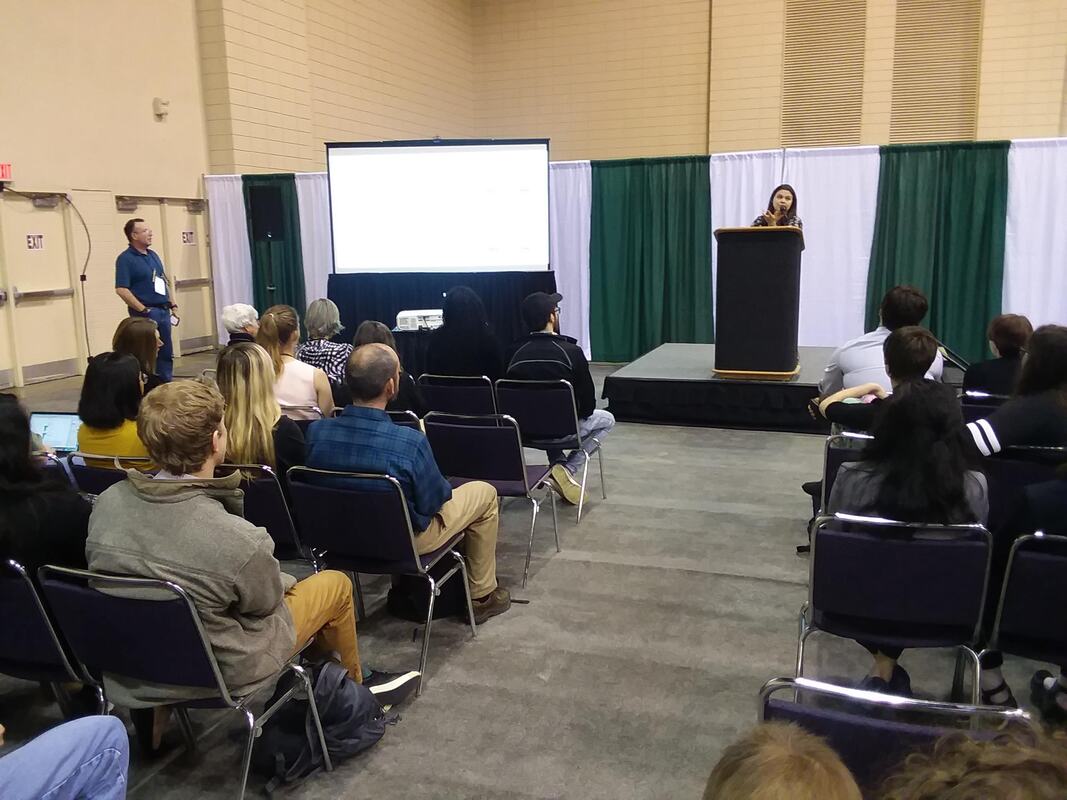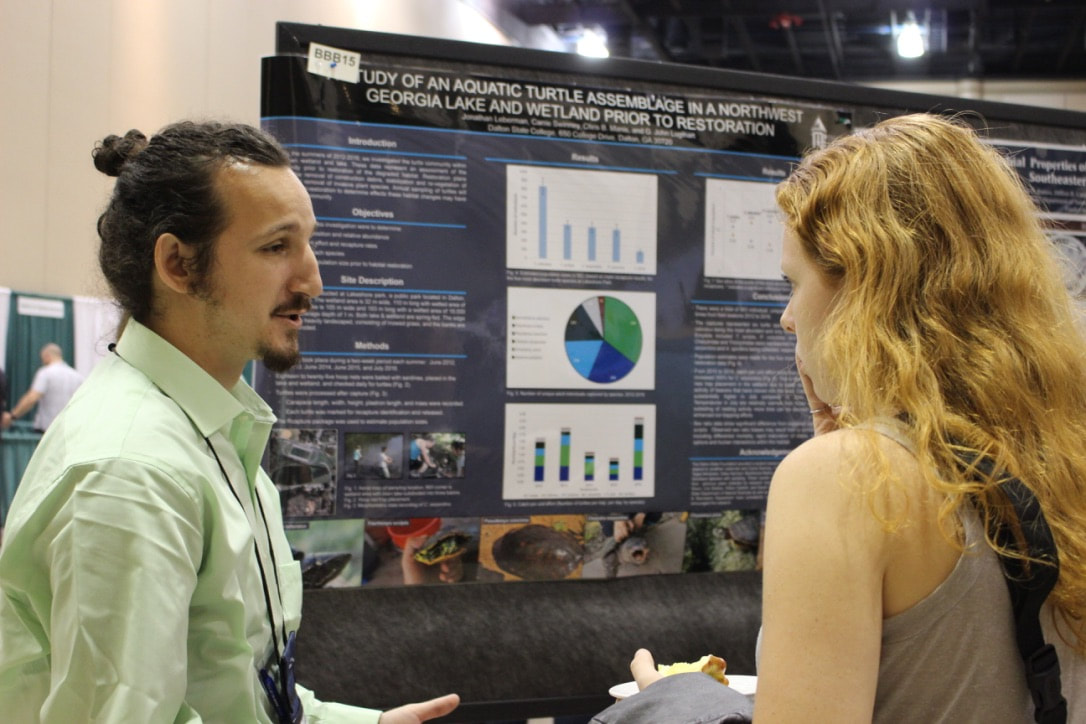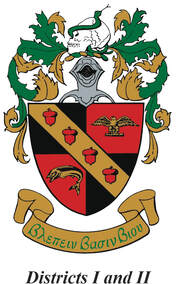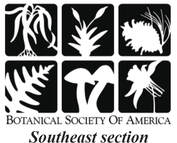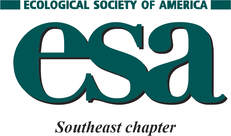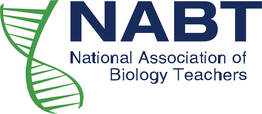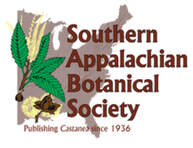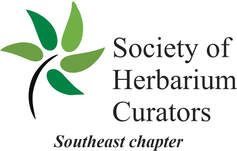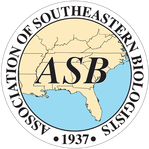ASB 2023 Winston-Salem
March 23-26*
*Note: this is a shift in our normal day schedule. ASB 2023 will begin on Thursday!
Download the Program App for your smart device at your favorite app store.
Search for ASB 2023 or sebiologists.
Or use the links below.
Search for ASB 2023 or sebiologists.
Or use the links below.
Learn more about the meeting
|
ASB Calendar (find deadlines here)
|
Register
REGISTER FOR ASB 2023 HERE
Early Bird Registration Ends March 1, 2023; afterwards higher rates will apply.
See the 2023 Registration Rates.
Become a member for discounted registration.
Early Bird Registration Ends March 1, 2023; afterwards higher rates will apply.
See the 2023 Registration Rates.
Become a member for discounted registration.
Special Events
SUBMIT AN ABSTRACT
Abstract submissions are now closed, but abstracts can be edited via the Presenter's Corner link in your acceptance letter.
Guidelines for Presentations can be found below.
Guidelines for Presentations can be found below.
Apply FOR AN AWARD or support
Award Submissions are now closed.
SPonsor ASB AND/or REgister as an exhibitor
The Association of Southeastern Biologists is dedicated to providing high-quality opportunities for biologists to present their work, network with peers, and develop professionally. Our Annual Meeting is a crucial step in the STEM-Student Pipeline giving many upcoming biologists, who will proceed to advanced degrees and careers in academia and industry, their first experience presenting science. It provides a friendly space to receive feedback, learn about job opportunities, and meet experts in the field. We would love to have you as part of it! Learn more about SPONSORING ASB.
|
Full schedule
For help with technical issues using the program page, please contact s[email protected]
|
Downloadable schedules
|
ASB 2023 R.H. Martin Plenary Speaker
Pulitzer-Prize Winning Journalist and Author Ed Yong
|
Named “the most important and impactful journalist" of 2020 by Poynter, Pulitzer Prize winner Ed Yong is a science staff writer with The Atlantic. He was awarded journalism’s top honor, the 2021 Pulitzer Prize for Explanatory Reporting, for his crucial coverage of the coronavirus pandemic. An accomplished speaker, Yong brings his vast scientific knowledge and engages his audiences through his insightful conversations about the pandemic, the animal kingdom, the challenges of science journalism, and more.
Ed Yong is the best-selling author of I Contain Multitudes: The Microbes Within Us, a groundbreaking, informative, and entertaining examination of the relationship between animals and microbes. His second book, An Immense World, takes a comprehensive look at the fascinating sensory worlds of animals. In addition to The Atlantic, his work has appeared in National Geographic, the New Yorker, Wired, Nature, New Scientist, and Scientific American, among others. Learn more about Ed Yong. Plenary Reception
There will be a reception and book signing following the plenary; please sign up for this event when you register for the meeting. Yong's latest book will be available for purchase at the reception through Bookmarks, a local literary arts nonprofit that cultivates community by bringing people of all ages together with books and authors who educate, inspire, challenge, and entertain. Their store is just around the corner from the conference center, so give them a visit while you are in town. |
|
About the R.H. Martin Plenary
Robert H. Martin, founder and owner of Martin Microscope Company from 1946 until his death in 2006, was an avid supporter of ASB and of the sciences in general. He supported ASB for decades as a Patron member and sponsor of the ASB Student Research Award, and, with his passing, his family established what has become the Robert H. Martin Plenary Address fund to help cover the costs of bringing in highly qualified speakers for the ASB annual meeting. |
Friday Night Social
This year's biggest party will take place at Winston-Salem's newest entertainment complex, ROAR.
ROAR has food, drinks, and four floors of fun! There will be music, boutique bowling, and virtual golf, soccer, and zombie dodgeball!
The Friday Night Social is a chance for attendees at the Annual Meeting to let loose at a unique local venue with food, music, and fun! Tickets are required for this event.
ROAR has food, drinks, and four floors of fun! There will be music, boutique bowling, and virtual golf, soccer, and zombie dodgeball!
The Friday Night Social is a chance for attendees at the Annual Meeting to let loose at a unique local venue with food, music, and fun! Tickets are required for this event.
Featured Institution
ASB partners with local universities and colleges, our Featured Institutions, so we may highlight their efforts in biological education, scholarship, and service and they can help support and host our Annual Meeting.
Annual Meeting Venue | Housing
|
Meeting Venue
Benton Convention Center 301 W 5th St Winston-Salem, NC 27101 |
Headquarters Hotel
Marriott Winston-Salem 425 N Cherry St Winston-Salem, NC 27101 |
Winston-Salem is a vibrant city with tasty restaurants, unique shops, and an amazing art district next to the convention center. We are very excited about the unique opportunities at this location and look forward to seeing all of you in the “City of Arts and Innovation.” Learn more at www.visitwinstonsalem.com where you can find “Things to Do” or “Wineries” or “Food & Drink”, etc. Download a Craft Crawl Map or take a Trolley Tour.
*If you intend to fly to Winston-Salem, the nearest airport is Greensboro/High Point (GSO) Airport which is 17.3 miles away. We recommend using a car-sharing service (such as Lyft or Uber). You can expect an approximately 25-minute trip.
|
Winston-Salem Parking Options
Fees are subject to change |
Valet
Valet parking at Marriott is $25 per day. Valet parking payments can be put onto a master account if the paying individual is provided or it will be included in the room bill. Valet parking at Embassy Suites TBA Laz Parking Deck
Directly across from the Marriott We recommend you check in and leave your luggage at the front desk first. $10 per day- park and stay with no in and out privileges. $20 per day- with in and out privileges Benton Parking Deck
Directly across from the Benton Convention Center on Cherry Street. We recommend you check in and leave your luggage at the front desk first. $9 per day during the week $2 per day after 5:30pm weekdays and on weekends Public Parking lot
Below the Benton on Cherry and 6th street. About 1 ½ blocks down from the Marriott. 2nd entrance is a public parking lot. First entrance is gated. We recommend you check in and leave your luggage at the front desk first. Free parking – based on availability |
Look for other great things to do while you are in Winton-Salem
www.visitwinstonsalem.com
www.visitwinstonsalem.com
2023 T-Shirt Design
T-shirts can be ordered until April 2nd. Use the QR code or click the picture for the link.
2023 T-shirt design contest winner: Elijah Wells, Campbell University, NC.
Special Events
Fireside Chat with SimBio
|
Affordable Active Learning for Intro Bio.
SimBio’s inquiry-driven teaching tools are popular in biology courses that emphasize experimentation and discovery. In his presentation, Dr. Eli Meir will demonstrate how SimBio’s SimUText System® lets you mix and match SimBio’s interactive tutorial/labs with chapters from an OpenStax Biology e-text to build an inexpensive active-learning replacement for your traditional Intro Bio textbook. He will be happy to brainstorm with participants on their particular teaching challenges! |
Symposia
COnservation Genetics
Organizers: Matt C. Estep, Appalachian State University, Boone, NC; Ashley Morris, Furman University, Greenville, SC
A symposium focused on utilizing genetic approaches in Conservation Biology.
A symposium focused on utilizing genetic approaches in Conservation Biology.
Jorō Spider SUmmit
|
Organizer: Patrick Cain, Georgia Gwinnett College, Lawrenceville, GA
Jorō spiders (Trichnephila clavata) are a recently introduced species to the southwestern United States, having become established and quickly increasing their range in a little over a decade. With this summit we seek to unify our understanding of the biology of Jorō spiders through talks on work that has been done and is ongoing, as well as organizing a speaker panel to identify knowledge gaps so that we may organize our efforts at understanding and, ultimately, controlling, this new spider. |
Creating and Implementing Change in Life Sciences Education
Organizers: Judy Awong-Taylor, Georgia Gwinnett College, Lawrenceville, GA; Jung Choi, Georgia Institute of Technology, Atlanta, GA; Christopher Finelli, University of North Carolina Wilmington, Wilmington, NC; Cerrone Foster, East Tennessee State University, Johnson City, TN; Ashley Haines, Norfolks State University, Norfolk, VA; Gail Hollowell, North Carolina Central University, Durham, NC; Nitya Jacob, Oxford College of Emory University, Oxford, GA; Mark Lee, Spelman College, Atlanta, GA; Kristen Miller, University of Georgia, Athens, GA; Katie Northcutt, Mercer University, Macon, GA; J. Scott Stauble, Germanna Community College, Locust Grove, VA; Jen Rhode Ward, University of North Carolina Asheville, Asheville, NC; Angela White, North Carolina State Agricultural and Technical University, Greensboro, NC; Michael Wolyniak, Hampden-Sydney College, Hampden-Sydney, VA
The Partnership for Undergraduate Life Sciences Education (PULSE) helps life sciences departments at all institutions of higher education align with national education reform initiatives so they can develop inclusive, student-centered, evidence-based teaching and learning in order to cultivate the development of scientists who reflect the diversity of American society.
This poster symposium is organized by the Southeastern Regional PULSE (SERP) Circle and is open to all ASB attendees. SERP is committed to supporting departments interested in inclusive, student-centered, evidence-based teaching and learning. We strongly encourage attendees of past SERP workshops and members of the broader ASB community to submit posters that showcase successful, intentional, data-driven teaching practices and strategies implemented at their institutions for improving undergraduate education and/or strategies leading to departmental-level change as recommended in AAAS's Vision and Change document. Please submit an abstract, share your successes and challenges, and network with others during this poster symposium.
The Partnership for Undergraduate Life Sciences Education (PULSE) helps life sciences departments at all institutions of higher education align with national education reform initiatives so they can develop inclusive, student-centered, evidence-based teaching and learning in order to cultivate the development of scientists who reflect the diversity of American society.
This poster symposium is organized by the Southeastern Regional PULSE (SERP) Circle and is open to all ASB attendees. SERP is committed to supporting departments interested in inclusive, student-centered, evidence-based teaching and learning. We strongly encourage attendees of past SERP workshops and members of the broader ASB community to submit posters that showcase successful, intentional, data-driven teaching practices and strategies implemented at their institutions for improving undergraduate education and/or strategies leading to departmental-level change as recommended in AAAS's Vision and Change document. Please submit an abstract, share your successes and challenges, and network with others during this poster symposium.
SUPPORTING INCLUSIVE AND SUSTAINABLE RESEARCH INFRASTRUCTURE FOR SYSTEMATICS (SISRIS) BY CONNECTING SCIENTISTS AND THEIR SPECIMENS
Organizers: Shawn Krosnick, Tennessee Tech University, Cookeville, TN; Andrea Weeks, George Mason University, Department of Biology and Ted R. Bradley Herbarium, Fairfax, VA
Speakers will deliver case-studies that illustrate the strengths, opportunities and technical challenges of integrating "people-data" into the infrastructure of biological research collections. The rationale for creating this event in addition to the workshop is to expand the number of people who encounter these ideas and to encourage exchanges among speakers and audience members that can build community momentum around inclusive and sustainable practices for collections-based research. Invited speakers will be solicited from diverse groups to ensure that the slate includes the expertise and perspectives of people from across the spectrum of collections-based researchers and biodiversity informaticians. This spectrum includes individuals with diverse personal backgrounds (e.g., gender, biological sex, race/ethnicity, disability status) as well as with diverse geographic and institutional associations. The keynote speaker for the symposium will be a biodiversity informatician, who can provide a technical explanation for how and why digitized biological research collections can be extended with people-data. We highlight this topic in the keynote because our experience indicates that many collections-based researchers who will be attending the conferences face barriers to staying up to date on the latest advances in biodiversity informatics. Speakers that follow the keynote address will describe ways they have used people-data to advance their collections-based research. These talks will include case studies of how uncovering the work of collectors from underrepresented groups has led to research discoveries.
Speakers will deliver case-studies that illustrate the strengths, opportunities and technical challenges of integrating "people-data" into the infrastructure of biological research collections. The rationale for creating this event in addition to the workshop is to expand the number of people who encounter these ideas and to encourage exchanges among speakers and audience members that can build community momentum around inclusive and sustainable practices for collections-based research. Invited speakers will be solicited from diverse groups to ensure that the slate includes the expertise and perspectives of people from across the spectrum of collections-based researchers and biodiversity informaticians. This spectrum includes individuals with diverse personal backgrounds (e.g., gender, biological sex, race/ethnicity, disability status) as well as with diverse geographic and institutional associations. The keynote speaker for the symposium will be a biodiversity informatician, who can provide a technical explanation for how and why digitized biological research collections can be extended with people-data. We highlight this topic in the keynote because our experience indicates that many collections-based researchers who will be attending the conferences face barriers to staying up to date on the latest advances in biodiversity informatics. Speakers that follow the keynote address will describe ways they have used people-data to advance their collections-based research. These talks will include case studies of how uncovering the work of collectors from underrepresented groups has led to research discoveries.
Conservation, Natural History, and Systematics of Crayfishes - a Southeastern perspective
|
Organizers: Zachary Loughman and Zackary Graham, West Liberty University, WV
Over the past several decades, numerous dedicated researchers have demonstrated that crayfishes play integral roles in freshwater systems. The influence of crayfish on instream process, species displacement, organic matter and sediment processing, and maintenance of biodiversity has been well documented. Recently, there has been renewed interest in understanding the phylogeny, distribution, life history, and population structure of many lesser-known taxa. Crayfish species are still being discovered and described while familiar invasive crayfish continue to plague ecosystems worldwide. What we are learning is that we have a lot left to learn about these enigmatic organisms: species-specific effects are quite common, most life history descriptions are best guesses, physiological and population constraints are largely unknown. The causes of conservation concern for most species however are strikingly similar – habitat degradation, taxonomic ambiguity, narrow and/or nebulous distributions, and unknown life histories are common themes. These are not necessarily crayfish-specific problems however, thus models providing viable solutions likely exist outside of the realm of astacology, opening the door for highly integrative and collaborative approaches. This session will serve to highlight recent case-studies and perspectives with a focus on approaches that merge novel and established tools for conservation, enhance ecological understanding, and in turn help bring crayfishes to the forefront of freshwater conservation efforts for practitioners, managers, decision-makers, and researchers. The perspectives of early-career scientists are particularly encouraged, and all speakers are challenged to provide a broad context and articulate how their study contributes solutions to the ‘crayfish conservation problem’. The session will be structured to highlight critical steps and information needed to guide development of a coordinated, integrative, and comprehensive crayfish conservation plan. |
Southeastern Chapter of the Ecological Society of America-sponsored Symposium: Revisiting some of the plants that William Bartram wrote about in his 'Travels' to North Carolina, 1775 and 1776
Panels
HITTING THE GROUND RUNNING WITH YOUR GRADUATE SCHOOL APPLICATIONS --HOSTED BY ASB'S HUMAN DIVERSITY COMMITTEE
Organizers: Jennifer Mandel, University of Memphis, Memphis, TN; Chinyere Knight, Tuskegee University, Tuskegee, AL; Veronica Segarra, Goucher College, Baltimore, MD
This 2nd annual workshop hosted by ASB's Human Diversity Committee has been designed to better prepare our undergraduate student members to apply to graduate school. Through dynamic discussion with more experienced ASB member panelists, this workshop will raise participants’ awareness of the key elements of successful graduate school applications—especially those that are often not explicitly described to or required from undergraduate applicants. After a short introductory presentation, an interactive moderated discussion will ensue with the help of experienced ASB members who will serve as panelists and answer prepared and real-time participants’ follow up questions related to the topic. There will also be short exercises throughout the workshop that will help attendees experience successful strategies for career development. The workshop will end with a short review of the take-home messages to remember.
This 2nd annual workshop hosted by ASB's Human Diversity Committee has been designed to better prepare our undergraduate student members to apply to graduate school. Through dynamic discussion with more experienced ASB member panelists, this workshop will raise participants’ awareness of the key elements of successful graduate school applications—especially those that are often not explicitly described to or required from undergraduate applicants. After a short introductory presentation, an interactive moderated discussion will ensue with the help of experienced ASB members who will serve as panelists and answer prepared and real-time participants’ follow up questions related to the topic. There will also be short exercises throughout the workshop that will help attendees experience successful strategies for career development. The workshop will end with a short review of the take-home messages to remember.
Career Pathways for Applied Environmental Scientists
Organizer: Sunny Fleming and Megan Martinez, ESRI
Historically, there were traditional career paths for students graduating with biology degrees. However, as global awareness around the interconnectedness of our environmental, social and economic systems increases, so too does demand for applied environmental knowledge across a wide array of industries. This panel will expose students to representatives from the public, non-profit and technology sectors whose career paths deviated from the “classic.” Students will hear about their experiences in college, in their careers and advice about navigating professional development. Audience members will also have an opportunity to ask the panelists questions in a light, fun and engaging session. The panel will feature Liv Haney, a Product Manager with Ecobot; Wesley Knapp, Chief Botanist for NatureServe, and Lesley Starke, Plant Conservation Program Manager for the North Carolina Department of Agriculture and Consumer Services.
Historically, there were traditional career paths for students graduating with biology degrees. However, as global awareness around the interconnectedness of our environmental, social and economic systems increases, so too does demand for applied environmental knowledge across a wide array of industries. This panel will expose students to representatives from the public, non-profit and technology sectors whose career paths deviated from the “classic.” Students will hear about their experiences in college, in their careers and advice about navigating professional development. Audience members will also have an opportunity to ask the panelists questions in a light, fun and engaging session. The panel will feature Liv Haney, a Product Manager with Ecobot; Wesley Knapp, Chief Botanist for NatureServe, and Lesley Starke, Plant Conservation Program Manager for the North Carolina Department of Agriculture and Consumer Services.
NSF RESEARCH AND TRAINING OPPORTUNITIES FOR BIOLOGISTS
|
Organizer: Matthew Herron, Program Director, Division of Biological Infrastructure, National Science Foundation
Join NSF Program Officers to learn about new and ongoing NSF funding opportunities of relevance to biologists at all career stages. This session will cover how NSF funds research, the grant proposal process, and funding opportunities through Biology core programs and current special solicitations. Overviews of Research Experiences for Undergraduates (REU) opportunities, the Graduate Research Fellowship Program (GRFP), Postdoctoral Research Fellowships in Biology (PRFB), the Faculty Early Career Development Program (CAREER), the Building Research Capacity of New Faculty in Biology Program (BRC-BIO) for early-career faculty at non-R1 institutions, and the Mid-Career Advancement (MCA) program will be provided. A question-and-answer session will follow the overview of the funding and training opportunities. |
PROMOTING STUDENT SUCCESS THROUGH IMPLEMENTATION OF SPECIFICATIONS GRADING IN STEM COURSES
Organizers: Jennifer Hurst-Kennedy, Georgia Gwinnett College et al.
Have you ever wondered if there was a grading method where students would be willing to try harder to show they have mastered content and spend less time begging for extra credit or extra points? Specifications grading might be your new best friend. Come learn how to use specifications grading in any course to enhance student learning and engagement. Panelists will include Chemistry, Math, and Biology faculty discussing how they implement specifications grading in their courses. We will also provide attendees with a "Specs Starter's Guide" with resources on how to use specifications grading in their classes.
Have you ever wondered if there was a grading method where students would be willing to try harder to show they have mastered content and spend less time begging for extra credit or extra points? Specifications grading might be your new best friend. Come learn how to use specifications grading in any course to enhance student learning and engagement. Panelists will include Chemistry, Math, and Biology faculty discussing how they implement specifications grading in their courses. We will also provide attendees with a "Specs Starter's Guide" with resources on how to use specifications grading in their classes.
Workshops
Build your own open-source hardware GPS data logger for wildlife movement studies
|
Thursday, March 23
Sign up during meeting registration. Additional fees for supplies required. Organizers: Patrick Cain, Georgia Gwinnett College, Lawrenceville, GA Toledo Zoo and Aquarium, Toledo, OH; Matthew Cross, Toledo Zoo and Aquarium, Toledo, OH Global Positioning System (GPS) technology has been a boon to animal spatial ecology studies, allowing researchers to obtain vast quantities of data, even for cryptic organisms. Oftentimes, the main limitation to wide-spread application of this technology is the cost, which can dictate the number of individuals outfitted with GPS technology, thereby limiting sample sizes. Here, we discuss the use of Arduino in developing a low-cost, customizable, open-source hardware GPS logger for use in animal movement studies. We also present results from field tests with eastern box turtles (Terrapene carolina) in northwestern Ohio. These GPS loggers have the potential to augment existing projects and facilitate studies that would be otherwise cost-prohibitive. This workshop will introduce attendees to the basic concepts of open-source, do-it-yourself technology and some of its applications. Attendees will learn how to assemble a GPS data logger through a guided exercise, and will be able to take home their creation. Sessions will include a brief lecture, basics of soldering tutorial (via a customized LED exercise), guided GPS unit construction, field testing, downloading and visualization of data, casing and attachment options, customization options, and future projects. Cain and Cross. 2018. An open-source hardware GPS data logger for wildlife radio-telemetry studies: A case study using Eastern box turtles. HardwareX. 3: 82-90 |
Spatial Analytics Workshop with ArcGIS Pro and ArcGIS Online
|
Organizer: Sunny Fleming and Megan Martinez, ESRI
There are a wide variety of analytics that biological and environmental professionals may need to apply in their careers and many ways to achieve these. In this 1 hour workshop, Esri will teach participants how to conduct presence-only predictive modeling, hot spot and cluster analysis, interpolation with kriging and more with ArcGIS Pro. We’ll discuss how to enhance analyses with the R-bridge, python and Jupyter notebooks before we briefly show how these analyses can be published to ArcGIS Online. Once in ArcGIS Online, users can create a wide array of information products to help interpret results for a public audience. |
SUPPORTING INCLUSIVE AND SUSTAINABLE RESEARCH INFRASTRUCTURE FOR SYSTEMATICS (SISRIS) BY CONNECTING SCIENTISTS AND THEIR SPECIMENS
|
Organizers: Shawn Krosnick, Tennessee Tech University, Cookeville, TN; Andrea Weeks, George Mason University, Department of Biology and Ted R. Bradley Herbarium, Fairfax, VA
Do you make or use herbarium specimens as part of your research? Are you interested in learning how to better document your botanical expertise and contributions to collections-based research by using the latest web-based informatics tools? Are you curious as to how these tools may also be used to advance research, improve collections management as well as build a more inclusive historical record by revealing hidden figures in botany? If so, please consider applying to attend the workshop at the Association of Southeastern Biologists Friday March 24, 2023, “Supporting inclusive and sustainable research infrastructure for systematics (SISRIS) by connecting scientists and their specimens”. We encourage individuals from all career-stages and institution types to apply. Stipends for participation should be available to defray the cost of attending, including dependent-care, sponsored by the US National Science Foundation. Attendance is capped at 25 participants. For further details and application link: https://tinyurl.com/3jmaztfa. Email contact for questions: [email protected]. |
Honey I Blew Up the Molecules: 3D Printing as a Multi-faceted and Multi-disciplinary Pedagogical Practice
Interested in engaging your students with hands-on models that bring abstract theories to physical ‘life’? Join us on a journey into the world of 3D printing molecular models to help students understand more complex concepts such as drug-molecule interactions, mutational effects on protein structure, and macromolecular composition. During this session, we focus on ways to expand 3D print models into larger course projects that incorporate multiple digital pedagogies such as: Poster presentation with Augmented Reality (AR) apps, exploration of enzyme active sites with Virtual Reality (VR) programs…and beyond! We will brainstorm ways to use this practice in diverse curricula, and in a variety of applications, from drone technologies to field work.
This session is on Friday (3/24) from 10-11 AM.
This session is on Friday (3/24) from 10-11 AM.
Field Trip
MONADNOCK FORESTS AND FIRE ECOLOGY AT PILOT MOUNTAIN STATE PARK
|
Sunday, March 26
Sign up during meeting registration. Organizers: Steph Jeffries (NC State University) and Dane Kuppinger (High Point University). Sponsored by the Southern Appalachian Botanical Society Join us at Pilot Mountain to learn about Piedmont monadnocks and fire history. Pilot Mountain, part of the Sauratown Mountains, supports xeric and sub-xeric forest communities which are distinct from the surrounding Piedmont forests. Unlike much of the Piedmont, these communities have been significantly shaped by both anthropogenic and naturally occurring fires. We plan to hike the Pilot Knob Trail and the Grindstone Trail to see effects from the 2021 fire and learn about the role of fire in these forests, as well as Kuppinger’s long-term community ecology research at Pilot Mountain. Participants can choose the shorter Pilot Knob hike (0.8 mi) that ends before lunch, or they can add the longer Grindstone Trail (3.5 mi, one-way downhill) to extend the field trip and wrap up by mid-afternoon. Registration $10; sign up during meeting registration. We will follow up with registrants to order box lunches. Transportation is on your own, but we can help arrange carpooling and a shuttle. |
Silent Auction
Bring items/BUy items to support students
|
The silent auction is an important fundraiser for the Enrichment Fund which provides support to help members attend the meeting. Please bring items you think might be of interest to attendees of our meeting. Items do not have to be related to the biological sciences, but this is a guaranteed shared interest among attendees. The items will be displayed in the Exhibit Hall during the meeting where anyone can place a bid. Bids close the last day of presentations, then the highest bidder pays for the item at the ASB booth and takes it home. Plan ahead and set aside items for the auction throughout the year, but don’t forget to bring them to the meeting!
|
PRESENTATION GUIDELINES
Abstract submissions are now closed,
but abstracts can be edited via the Presenter's Corner link in your acceptance letter.
but abstracts can be edited via the Presenter's Corner link in your acceptance letter.
PRESENTATION TYPES
Abstracts submitted to the annual meeting of the Association of Southeastern Biologists are reviewed for completeness and appropriateness by an editing board consisting of members of the program committee and the editor of the bulletin of ASB, Southeastern Biology. Abstracts submitted for awards are further reviewed for eligibility by judges aligned with those organizations. Editors and judges are professional biologists. Abstracts are published in Southeastern Biology, the official bulletin of ASB.
Beta Beta Beta submissions are reviewed by the leaders of Beta Beta Beta districts I and II. Further information for these submissions is provided by Beta Beta Beta.
Each abstract should be no more than 300 words.
Abstracts submitted to the annual meeting of the Association of Southeastern Biologists are reviewed for completeness and appropriateness by an editing board consisting of members of the program committee and the editor of the bulletin of ASB, Southeastern Biology. Abstracts submitted for awards are further reviewed for eligibility by judges aligned with those organizations. Editors and judges are professional biologists. Abstracts are published in Southeastern Biology, the official bulletin of ASB.
Beta Beta Beta submissions are reviewed by the leaders of Beta Beta Beta districts I and II. Further information for these submissions is provided by Beta Beta Beta.
Each abstract should be no more than 300 words.
Oral PResentations
Poster PResentations
|
Posters offer an effective way to communicate preliminary data and or novel ideas/hypotheses that can stimulate discussion with interested viewers. Presenters will bring a printed poster to be displayed all day (either Friday or Saturday). The presenter(s) must be present during their assigned hour-long poster session on one of those days. Posters should fit within a 46" (Width) x 44" (Height) space. Presenters may also submit a digital poster to allow attendees to view the poster throughout the week via the meeting app. All award seekers are required to submit their posters digitally for judging. Instructions for digital poster uploads will be sent with acceptance letters. All other poster presenters have the option to submit their posters digitally. Posters will be available for the registrants on the meeting’s app during the week of the event. We strongly encourage digital submissions to allow attendees increased accessibility, which should provide schedule flexibility and expedited in-person poster visits to minimize crowding during the sessions.
|
lightning talks
|
A less formal format to share new ideas and hypotheses, discuss novel experimental approaches, or present truly preliminary results. No more than 5 heart-pounding minutes and 3 PowerPoint slides to leave your mark, engage, and connect with others. Only a title and a brief abstract to explain your idea is required. Limited time slots available, so act fast. Slots will be filled on a first-come basis and others will be added to a waiting list. This session will take place in the Exhibit Hall.
|
Tribeta Presentations
|
Beta Beta Beta (TriBeta) is a biological honor society for students and researchers submitting to Tribeta must be active members of a Tribeta chapter. Tribeta Districts I and II meet conjointly with ASB annually and Tribeta talks and posters will be presented on Saturday concurrently with ASB sessions. Tribeta students must register for the ASB meeting.
All Tribeta presentations are judged for Tribeta Awards. |
Registration
Early Bird Registration Ends March 1, 2023; afterwards higher rates will apply.
Early Bird Registration Ends March 1, 2023; afterwards higher rates will apply.
During the registration process, you will be able to
- Become a member or renew your membership
- Buy tickets to the Plenary Reception and Book Signing, Friday Night Social, and Saturday Awards Banquet
- Register for luncheons hosted by our committees and affiliates
- Sign up for workshops and field trips
- Purchase ASB 2023 T-shirts
- Register a guest (guests may only attend social events)
- Make a donation to ASB
REGISTRATION RATES
Membership Status |
Early Registration Rate |
Registration Rate after 1 March 2023 |
ASB Emeritus Member |
$150 |
$200 |
ASB Life Member |
$285 |
$355 |
ASB Professional Member |
$285 |
$355 |
ASB Student Member |
$150 |
$200 |
Professional Non-Member |
$355 |
$425 |
Student Non-Member |
$200 |
$255 |
ADDITIONAL REGISTRATION EVENTS
Ticketed Events |
Date |
Location |
Ticket Price |
Post-Plenary Welcome Reception |
Thursday, 23 March |
Benton Ballroom |
$10 |
Friday Night Social |
Friday, 24 March |
$40 |
|
Saturday Night Banquet |
Saturday, 25 March |
Benton Ballroom |
$40 |
Exhibit your company | institution | organization at our annual meeting
|
Why should your company or university exhibit with ASB in Winston-Salem?
This three-day event brings together approximately 800 biologists from across the southeastern United States. The meeting features a distinguished plenary speaker, special symposia, oral and poster presentations, workshops, networking and social events, and more. The Annual Meeting provides you with the exclusive opportunity to network with this large and important audience of faculty, students, researchers, conservation workers, military and government personnel, and business professionals with a common interest in biological issues. Interests are diverse, but range from genetics and molecular biology, to physiology and population biology, to community and ecosystem ecology. Learn more about Exhibiting and Sponsoring Here. |
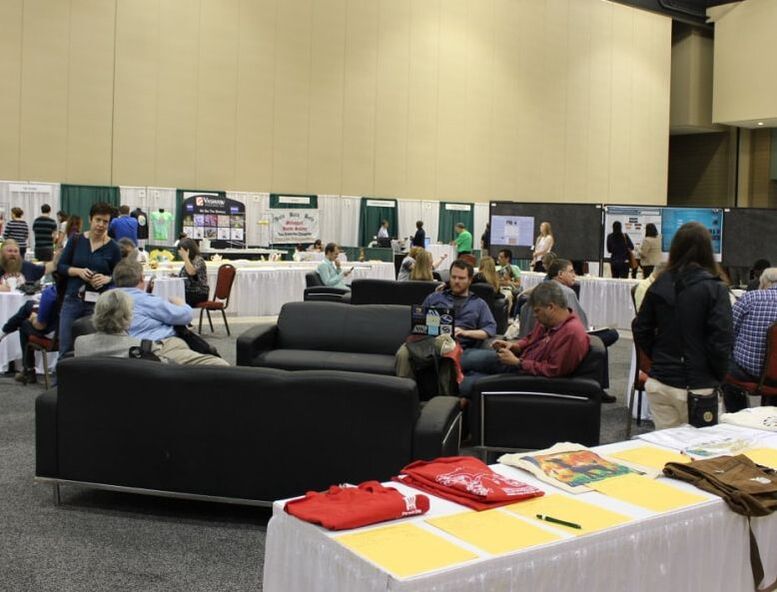 ASB 2017 Exhibit Hall, Montgomery, AL ASB 2017 Exhibit Hall, Montgomery, AL
|
